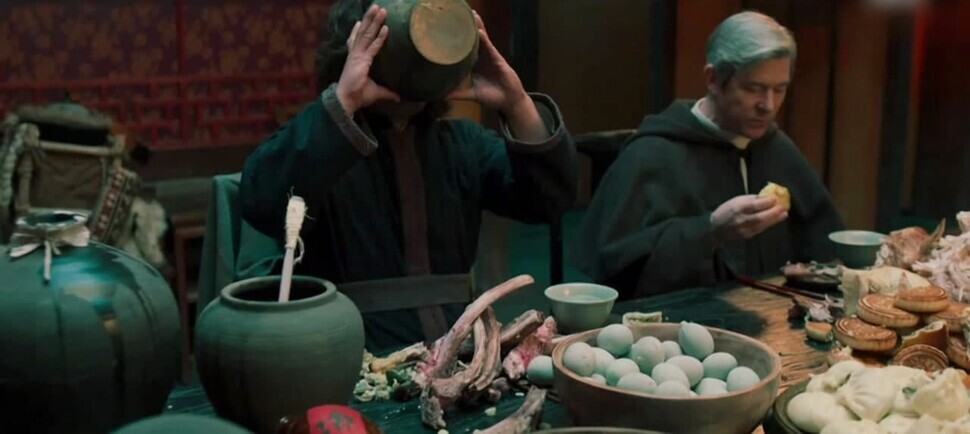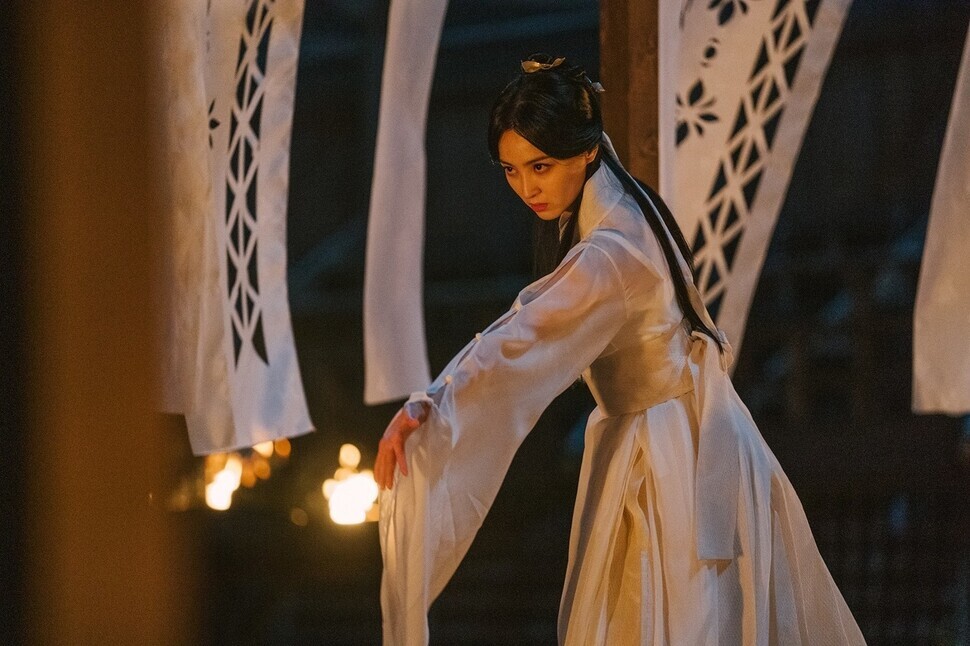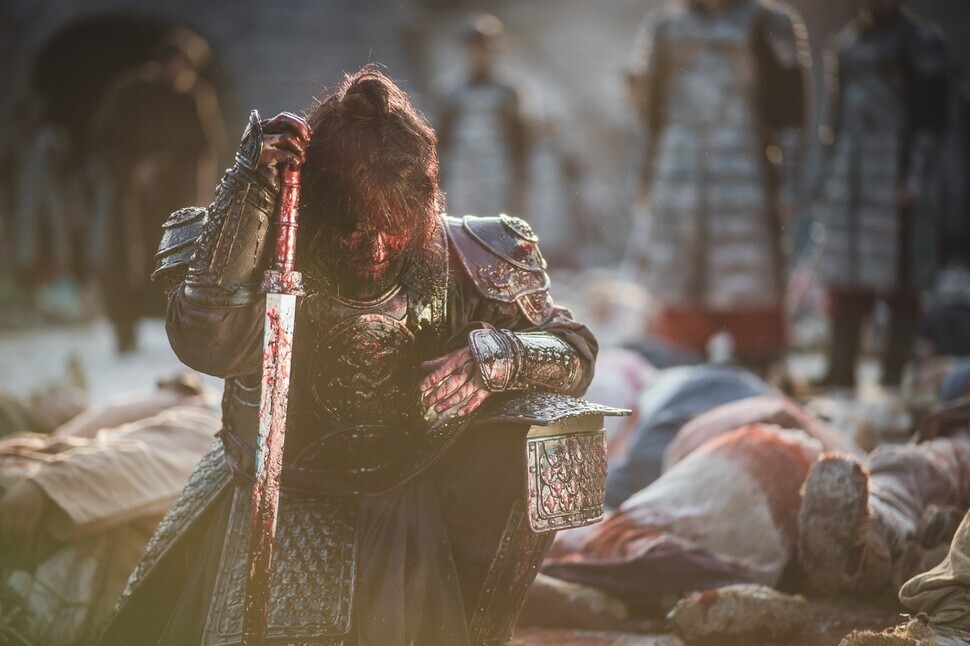hankyoreh
Links to other country sites 다른 나라 사이트 링크
[Column] "Joseon Exorcist" controversy encapsulates South Korea today

A recent series marked a historic moment in South Korean broadcasting — and not in a good way, unfortunately.
"Joseon Exorcist" was an SBS miniseries scheduled on Mondays and Tuesdays. Set against the backdrop of the early Joseon era, it included actual historical figures as characters, such as King Taejong, Grand Prince Yangnyeong and Grand Prince Chungnyeong.
It was a work of historical fantasy in which evil spirits interfered in the process of Joseon's early establishment, resulting in an exorcist being called in from the distant Western Regions to fight them.
Yet viewers found themselves confronted with moments that were quite suspect even when the historical fantasy element was taken into account.
Quite a few viewers were perturbed by scenes that showed Taejong (Kam Woo-sung) massacring commoners with a sword after seeing a vision, or Grand Prince Chungnyeong (Jang Dong-yoon) dismissively explaining that Mokjo, one of the dynasty's six great ancestors, had settled in Samcheok after "fleeing in the night because of a gisaeng [female entertainer]."
Distortions prompt unprecedented early cancellationThe main factor behind the controversy was the use of Chinese-style props.
The ire of viewers was stoked by scenes showing Chungnyeong entertaining the arriving exorcist at a gisaeng house near Uiju and another showing characters eating mooncakes, century eggs, and Chinese dumplings and alcohol in a Chinese-style house decorated with numerous Chinese items. It seemed preposterous: what royal dynasty would treat an arriving emissary to the cuisine of another country?
When confronted with viewers' questions, the producers explained that the location was a "place for the exorcist and his group from the Western Regions to rest after just arriving in Joseon via Ming Dynasty China."
"Since the region was close to the Chinese border, we used our imagination and added the props on the assumption that there would have been frequent visits by Chinese people," they said.
But that explanation only fueled the controversy further. During the time in question, the area around Uiju did not mark the border between Joseon and China but between Joseon and the Jurchen region. If anything, it would have been more natural for the visitors to have arrived in Joseon from China by sea, observers noted.
In addition to the unconvincing explanations, the controversy escalated sharply as people began focusing on the history of writer Park Gye-ok, who took a similar cavalier approach to history in his writing for the tvN series "Mr. Queen," which finished its run just a month earlier.
Over 130,000 people added signatures in the space of a day to a Blue House citizens' petition demanding an end to "Northeast Project dramas" that distort history. Sensing the heated reaction from viewers, advertisers and sponsors began pulling their commercials and support.
"Joseon Exorcist" finally became the first Korean drama in history to be taken off the air after just two episodes.

I have no intention of defending the historical distortions in "Joseon Exorcist" in the name of freedom of expression. Park Gye-ok will need to answer for the fast-and-loose approach he has adopted toward history in two straight series.
And the K-drama industry as a whole bears some responsibility as well, with its history of authors writing what they see fit without taking the time to conduct in-depth historical research or to painstakingly examine the situation at the time — and then shrugging off the criticisms by referring to their work as "fusion history" or "historical fantasy."
It's also problematic that the elements in question weren't spotted and removed by the producers or anyone else when they surely must have had time to scrutinize the script during the preparation process.
But this unprecedented turn of events with a show being canceled just a week into its run also raises a couple of concerns that will need to be closely considered.
Escalating into discriminatory allegationsOne of those has to do with the claims made in some corners of the internet that Park Gye-ok is "Korean Chinese." In other words, people aren't simply raising issues with Park's laziness and frequent historical distortions but questioning his nationality.
One reason for this is that Park has worked many times with Chinese funding in the past. A look at his registered writing history over the past few years also shows involvement in quite a lot of China-related content, and Korean Chinese characters have featured in his past work, such as the film "Innocent Steps" (2005) and the TV series "Cain & Abel" (2009) and "Doctor Prisoner" (2019).
But at root, what these claims are really suggesting is something more discriminatory: the implication that while Park may be ethnically Korean, he is Chinese by nationality, which would explain why the content he produces is consistent with the claims of the Northeast Project.
Speculation concerning Park's origins may have begun to emerge around the premiere of "Doctor Prisoner," which was his third effort to feature a Korean Chinese character.
This attitude — speculating about a writer's place of birth after one of his works shows evidence of historical distortion — is a reflection of deeply rooted discrimination among certain South Koreans, who view all Korean Chinese people as "agents" who walk around in their midst, yet who might turn around at any moment and throw their support behind state propaganda efforts by the Chinese government.
As the controversy escalated, the production company stated that Park Gye-ok was not Korean Chinese. A look back at his entertainment industry career, which dates all the way back to his writing credit for the 1995 film "Money in My Account," does not support the hypothesis that he had been hiding his identity over the years, biding his time before unleashing historical distortions once the Northeast Project had begun.
A more rational conclusion is that he began working in earnest to develop China-related content around the same time that Chinese money began pouring into the South Korean entertainment industry.

But does the writer's origin matter either way? Even if Park was Korean Chinese that would still only mean that he is an individual with unfortunate attitudes about history. It doesn't legitimize the claim that he is taking part in the Chinese government's historical propaganda efforts because he is Korean Chinese.
The media, for its part, has not been calling out or warning against the kind of discriminatory incitement that the "Korean Chinese" claims represent. Instead, they've been fanning the flames, publishing articles that relay the indiscriminate allegations made in online communities as if they were some kind of sporting match.
Not only that, but the media have also been blaming the actors themselves for appearing on the show. They have pressed a mask company to replace actor Shin Hye-sun as their model after her appearance in "Mr. Queen," one of Park Gye-ok's earlier shows featuring similar historical distortions.
This attitude of holding everyone who took part in the making of content that could be construed as distorting history — no matter how large or small their share of the responsibility — amounts to a form of violence, which forgoes any sort of discussion or dialogue in favor of simply forcing people to "pick sides."
Additionally, many media have responded to these forms of nationalist incitement and their "Korean" vs. "non-Korean" divisions not by raising issues or warning against it, but by simply reporting on it as straight news.
“Korea today” in a nutshellIn addition to the critics who have crossed the line beyond simply raising issues about distortions and ventured into the territory of nationalistic, discriminatory incitement, and the media that have failed to call any of this into question, the network bears some of the blame for making the situation worse.
Whenever comments have been raised in the past about things like unnecessary violence in dramas and comedy shows, content that encourages prejudice and discrimination toward minority groups, and issues of misogyny, South Korea's broadcasters have always talked about "creative freedom." To the extent that they have apologized, it has been something along the lines of "We're very sorry if our viewers were upset, even though that was not our intention."
If the networks had put more effort into actually engaging in dialogue over the issues raised with their content and proceeding toward a historical consensus on the ethics of creative representation, then the debate over "Joseon Exorcist" might have turned into a productive discussion on "the ethics of historical representation in historical fantasy."
Instead, they have always chosen to put the task off until later, offering a "We're sorry that you're mad" apology. But after the advertisers and sponsors pulled out, SBS had no recourse but to cancel its series after its first week on the air. Rather than responding to what is "right" or "wrong," the network bowed to the logic of power and capital.
From the standpoint of SBS, cancellation may have been the only option in light of the growing outcry. But it ended up sending the wrong signal by suggesting that issues can't be resolved through discussion and productive debate — and that the only answer lies in getting enough people behind you to apply financial pressure.
So the producers did not examine things the way they should have. The public did not show the restraint it should have. The media did not raise the issues it should have, and the network did not address the tasks that it should have been addressing.
Sadly, the end result sent the message that the answer lies in power and money rather than in dialogue.
In an ironic sense, the sequence of events surrounding "Joseon Exorcist" — a show that severely distorted the Korea of history — encapsulated South Korea's situation today.
By Lee Seung-han, TV columnist
Please direct comments or questions to [english@hani.co.kr]

Editorial・opinion
![[Column] The state is back — but is it in business? [Column] The state is back — but is it in business?](https://flexible.img.hani.co.kr/flexible/normal/500/300/imgdb/original/2024/0506/8217149564092725.jpg) [Column] The state is back — but is it in business?
[Column] The state is back — but is it in business?![[Column] Life on our Trisolaris [Column] Life on our Trisolaris](https://flexible.img.hani.co.kr/flexible/normal/500/300/imgdb/original/2024/0505/4817148682278544.jpg) [Column] Life on our Trisolaris
[Column] Life on our Trisolaris- [Editorial] Penalties for airing allegations against Korea’s first lady endanger free press
- [Editorial] Yoon must halt procurement of SM-3 interceptor missiles
- [Guest essay] Maybe Korea’s rapid population decline is an opportunity, not a crisis
- [Column] Can Yoon steer diplomacy with Russia, China back on track?
- [Column] Season 2 of special prosecutor probe may be coming to Korea soon
- [Column] Park Geun-hye déjà vu in Yoon Suk-yeol
- [Editorial] New weight of N. Korea’s nuclear threats makes dialogue all the more urgent
- [Guest essay] The real reason Korea’s new right wants to dub Rhee a founding father
Most viewed articles
- 160% of young Koreans see no need to have kids after marriage
- 2[Column] Life on our Trisolaris
- 3New sex-ed guidelines forbid teaching about homosexuality
- 4Presidential office warns of veto in response to opposition passing special counsel probe act
- 5How daycares became the most viable business for the self-employed
- 6OECD upgrades Korea’s growth forecast from 2.2% to 2.6%
- 7Amid US-China clash, Korea must remember its failures in the 19th century, advises scholar
- 8Months and months of overdue wages are pushing migrant workers in Korea into debt
- 9[Column] The state is back — but is it in business?
- 10[Guest essay] Maybe Korea’s rapid population decline is an opportunity, not a crisis